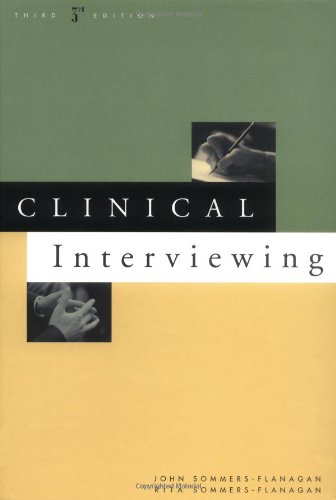Clinical interviewing 1st Edition by John Sommers Flanagan, Rita Sommers Flanagan ISBN 1119215587 9781119215585 by John Sommers-flanagan, Rita Sommers-flanagan 0471415472 instant download after payment.
Clinical interviewing 1st Edition by John Sommers Flanagan, Rita Sommers Flanagan - Ebook PDF Instant Download/Delivery: 1119215587, 9781119215585
Full download Clinical interviewing 1st Edition after payment

Product details:
ISBN 10: 1119215587
ISBN 13: 9781119215585
Author: John Sommers Flanagan, Rita Sommers Flanagan
Clinical Interviewing is the essential guide to conducting initial interviews, suicide assessment, mental status examinations, and psychotherapy skill development. The Sixth Edition includes:
- Updates focusing on latest trends in clinical interviewing research and practice
- Updated information on technology-based interviewing
- Access to over 70 videos that show the authors discussing and demonstrating crucial interviewing techniques
- Online instructor’s manual and resources to facilitate teaching
- Fresh case examples to help apply interviewing skills and concepts
- New coverage of special populations and multicultural considerations
- Expanded skills coverage to help facilitate client insight and action
This new edition also includes a Registration Access Card with a unique one-time code to access the Wiley Interactive E-Text (Powered by VitalSource), enhanced with dynamic content, including instructional videos and practice questions to further enrich student learning. It provides uninterrupted, mobile access anywhere, anytime.
Clinical interviewing 1st Table of contents:
Part I: Foundations of Clinical Interviewing
- Chapter 1: Introduction to Clinical Interviewing
- Definition and Purpose of the Clinical Interview
- Historical Context and Evolution of Interviewing
- Importance of Interviewing in Mental Health Practice
- Core Skills and Qualities of an Effective Interviewer
- Ethical Considerations in Interviewing (Introduction)
- Chapter 2: Theoretical Perspectives on Interviewing
- Psychodynamic Approaches (e.g., free association, transference)
- Humanistic/Client-Centered Approaches (e.g., empathy, unconditional positive regard)
- Cognitive-Behavioral Approaches (e.g., behavioral observation, thought monitoring)
- Systems Approaches (e.g., family dynamics, communication patterns)
- Integrative Approaches to Interviewing
- Chapter 3: Ethical and Legal Considerations
- Confidentiality and its Limits (Duty to Warn/Protect)
- Informed Consent
- Boundaries and Dual Relationships
- Competence and Scope of Practice
- Cultural Sensitivity and Ethical Practice
- Documentation and Record Keeping
- Chapter 4: Cultural Competence in Interviewing
- Defining Culture and its Impact on Mental Health
- Understanding Bias and Stereotypes
- Strategies for Culturally Sensitive Interviewing
- Working with Interpreters and Language Barriers
- Addressing Diversity (e.g., race, ethnicity, gender, sexual orientation, disability)
Part II: The Interview Process: Stages and Skills
- Chapter 5: Beginning the Interview: Establishing Rapport and Structure
- Initial Greeting and Seating Arrangements
- Building Rapport and Therapeutic Alliance
- Setting the Agenda and Explaining the Process
- Managing Initial Anxiety (Client and Interviewer)
- Open-ended Questions and Invitations to Talk
- Chapter 6: Core Interviewing Skills I: Active Listening and Observation
- Attending Behaviors (SOLER)
- Verbal Following (e.g., minimal encouragers, restatement)
- Paraphrasing and Summarizing
- Reflecting Content and Feeling
- Nonverbal Communication: Observing and Interpreting
- Chapter 7: Core Interviewing Skills II: Questioning Techniques
- Open-ended vs. Closed-ended Questions
- Probes and Clarification
- Concreteness and Specificity
- Leading Questions (and when to avoid them)
- Solution-Focused Questions
- Miracle Question
- Chapter 8: Exploring the Client's Story: Content and Process
- Narrative Approaches to Understanding Clients
- Identifying Key Themes and Patterns
- Exploring Thoughts, Feelings, and Behaviors
- Understanding the Client's Perspective and Worldview
- Managing Resistance and Ambivalence
- Chapter 9: The Mental Status Examination (MSE)
- Purpose and Components of the MSE
- Appearance, Behavior, and Speech
- Mood and Affect
- Thought Process and Content
- Perception (Hallucinations, Delusions)
- Cognition (Orientation, Memory, Attention, Concentration)
- Insight and Judgment
- Chapter 10: Ending the Interview: Closure and Next Steps
- Summarizing Key Points
- Checking for Understanding
- Formulating Next Steps (e.g., homework, follow-up appointments, referrals)
- Managing Termination and Saying Goodbye
- Documenting the Interview
Part III: Specialized Interviewing Contexts and Challenges
- Chapter 11: Crisis Interviewing and Risk Assessment
- Identifying and Responding to Crisis Situations
- Suicide Risk Assessment (Ideation, Plan, Means, Intent)
- Homicide Risk Assessment
- Safety Planning and Crisis Intervention Strategies
- Working with Clients in Acute Distress
- Chapter 12: Interviewing Children and Adolescents
- Developmental Considerations in Interviewing
- Building Rapport with Young Clients
- Using Play and Creative Techniques
- Involving Parents/Guardians (Confidentiality Issues)
- Addressing Child Maltreatment and Abuse
- Chapter 13: Interviewing Families and Couples
- Systemic Interviewing Principles
- Identifying Communication Patterns and Relational Dynamics
- Managing Multiple Perspectives and Alliances
- Techniques for Facilitating Family/Couple Communication
- Chapter 14: Interviewing Diverse Populations (Advanced Topics)
- Interviewing Clients with Substance Use Disorders
- Interviewing Clients with Psychotic Disorders
- Interviewing Clients with Personality Disorders
- Interviewing Clients from Specific Cultural Backgrounds (e.g., refugees, immigrants)
- Trauma-Informed Interviewing
- Chapter 15: Documentation and Report Writing
- Principles of Good Documentation
- Types of Clinical Notes (e.g., SOAP, DAP)
- Writing Comprehensive Assessment Reports
- Legal and Ethical Aspects of Documentation
- Electronic Health Records
Part IV: Professional Development in Interviewing
- Chapter 16: Supervision and Self-Care for Interviewers
- The Role of Clinical Supervision
- Receiving and Utilizing Feedback
- Managing Countertransference and Burnout
- Strategies for Self-Care and Professional Development
- Chapter 17: Advanced Topics and Future Directions in Interviewing
- Motivational Interviewing
- Brief Solution-Focused Interviewing
- Narrative Therapy Techniques
- The Impact of Technology on Interviewing (Telehealth)
- Research and Evidence-Based Interviewing Practices
People also search for Clinical interviewing 1st:
clinical research interview questions
clinical interview psychology template
patient centred clinical interviewing
clinical interview psychology questions
clinical interview psychology pdf
Tags: John Sommers Flanagan, Rita Sommers Flanagan, Clinical, interviewing



